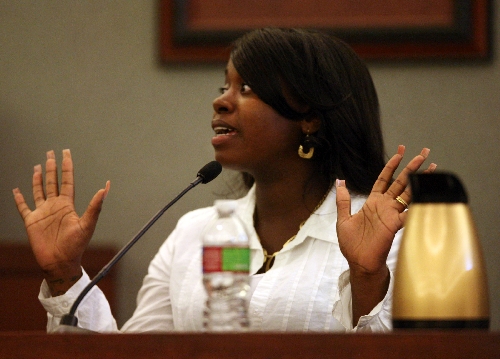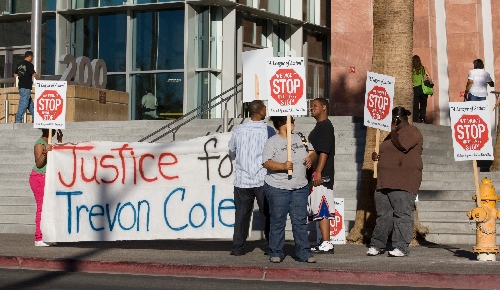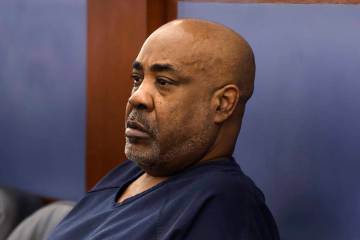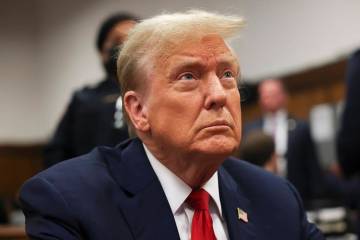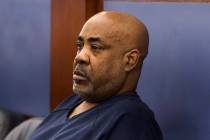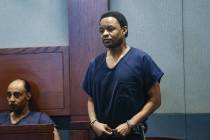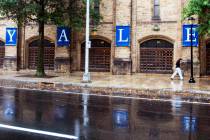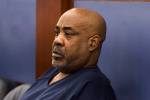Officers in fatal shooting asked about conflicting statements
On a day marked by conflicting statements, foggy memories and faulty assumptions, Friday's testimony at the coroner's inquest into the fatal police shooting of 21-year-old Trevon Cole left more questions than answers.
Chief among them: Was officer Stuart Richmond in the bedroom when Detective Bryan Yant fired the fatal shot?
"You told investigators that after the shooting, the elusive Mr. Richmond was in the bedroom," Assistant District Attorney Chris Owens pointedly said to narcotics Detective Bryan Brooks after he testified that Richmond was not in the room.
The detective said he had assumed Richmond was in the room during the shooting because he saw him leave the apartment with Cole's pregnant fiancee, who had hidden in a bedroom closet.
Owens called Brooks' assumption "unfortunate."
"If he had been in there, maybe he could help us explain why Mr. Cole is dead," Owens said of Richmond.
The exchange was typical of Friday's unusually confrontational inquest, where Owens and Chief Deputy District Attorney Christopher Laurent did not shy away from calling out officers for making conflicting statements. The judge asked officers more than 300 questions submitted by Cole's family and public advocates.
"I think Owens is handling it like a DA prosecuting a case," said attorney Andre Lagomarsino, who is representing Cole's family.
The inquest continues today with testimony from Yant and two other officers -- the sergeant at the shooting scene and the homicide detective who investigated the case for the department.
On Friday prosecutors grilled most of the officers present at the shooting and compared their responses to their own previously recorded statements to homicide detectives -- and to Yant's recorded statement. Because Yant is the only officer who witnessed the shooting, prosecutors turned their focus to questions raised by the testimony of other officers at the scene: Why did Yant believe Cole was a career drug-trafficker? Did officer Richmond participate in a raid that he shouldn't have? Why did the sergeant on scene not immediately notify medical dispatchers that Cole had been shot?
The lingering questions punctuated the day of testimony from witnesses ranging from five of the seven officers involved in the ill-fated raid to Sequioa Pearce, who repeated her claim that her fiance had his hands raised when he was shot.
case work
In early April, Yant found a Craiglist advertisement offering "grand daddy purp" and "good kush," both nicknames for types of marijuana, according to Detective Christopher Cannon, who is on the same six-member narcotics squad. On April 28, Yant asked Cannon to call the number in the ad to set up an undercover buy. Cole answered the phone.
On three occasions Cannon bought small amounts of marijuana while trying to lure Cole into selling more serious products. On one occasion, captured by hidden cameras set up by Langley Productions, the same company that produces the show "Cops," Cannon asked Cole to sell him cocaine. Cole appeared to dodge the issue, telling Cannon to call him in two hours. Another time, Cannon asked Cole to sell him a gun. Cole returned the call stating he had information on how to get one and would call again about it.
Neither of the deals came to fruition for Cannon, who was trying to see whether it was worth pursuing a criminal case against Cole.
"I wanted to know how big of a player he was," Cannon said Friday.
More than a year before the investigation, Matthew Peak, a special agent with the Office of Special Investigations at Nellis Air Force Base, began looking into airmen selling -- and buying -- drugs on and off base. He placed a handful of phone calls to members of the Metropolitan Police Department's narcotics unit to help out. Peak testified that only one of the department's units called him back: Yant's squad, number eight.
Together the Air Force investigators witnessed, but did not participate in, about 13 search warrant raids that the narcotics squad served, Peak said. Each time the federal investigators interviewed the suspects outside. The two groups became so close that the Air Force detectives began donning similar drab olive uniforms on the raids, Peak said.
In June Cole came to the attention of both Air Force investigators and Las Vegas detectives. A confidential informant told Peak of a person named "Big," who was selling marijuana off base to airmen. Peak placed a call to Yant's sergeant, John Harney. Sure enough, Yant had been buying from a "Big." Cole, at 5 feet 11 inches and 294 pounds, went by the same moniker.
Because Yant had located and targeted Cole, Yant was the official "case agent" for the investigation, Cannon said.
Yant was responsible for getting background information on the suspect, filing search warrants and organizing the team to serve the warrant.
However, he committed gross errors during the process. Despite having a copy of Cole's California driver's license complete with a physical description and date of birth, Yant confused Cole with a Trevon Cole from Houston and California, who was seven years older, at least 3 inches shorter and 100 pounds lighter. That Trevon Cole had several marijuana possession charges on his record; the Trevon Cole who Yant was targeting had none. The false information made it on to the affidavit, which a judge used to authorize a night-time search warrant raid on Cole's east valley apartment.
plans change
Yant and his team initially set out to perform simultaneous "busts" on Cole. While Yant's squad arrested Cole during an undercover buy away from his apartment, another squad would safely raid the apartment. But the plan fell apart after a member of the other squad was held up at gunpoint in an unrelated case, Cannon said.
So Yant assigned his six-member squad to raid Cole's one-bedroom apartment at 2850 E. Bonanza Road, alone and at night.
Also present would be a patrol officer, Richmond, who was interested in joining the narcotics unit and would get a taste for what it's like. But he wasn't allowed to bust through the doors because he didn't have the proper training.
Four Air Force investigators, including Peak, would be there to interview Cole afterward. Another patrol officer, nine-year veteran Blane Tripp , was required to stand guard outside in uniform; the department requires a uniformed officer for such raids because the narcotics officers would be in green uniforms.
Yant organized his squad into three groups of two officers -- standard procedure when raiding homes, officers said. The groups of two were supposed to stick together when in the home, watching each other's backs.
However, Richmond's role in the operation is cloudy. Some officers said Friday he was to line up like the rest of the officers who were going to burst into the home but stop before entering the doorway; they said he did that. But prosecutors played a tape of Yant's interview with homicide detectives in which he said Richmond was supposed to be his partner and enter the home with him. Richmond himself said he was told to merely stay in the back of the line and go inside.
In any case, Yant entered the dimly lit home without any clear partner. Officers testified that Cole and Pearce didn't answer the door after they knocked and announced they were police. To make matters worse, the flashlight on Yant's AR-15 rifle malfunctioned, prosecutors said.
Since Yant didn't have a clear partner with him and no flashlight, he found himself in the doorway to the small apartment's unlit bathroom, staring into the dark at Cole while the other officers cleared the apartment and dealt with Pearce.
Cole was either crouched or standing over the toilet, flushing drugs, prosecutors said. He turned to look at Yant and the officer fired once, striking him in the left cheek. The force of the concussion killed him instantly, the medical examiner testified.
Because Yant hasn't testified, it's not clear why he fired. Police said soon after the incident that Cole made a "furtive movement." Two of the officers who testified Friday said Yant claimed he thought Cole had a gun.
"He pretty much was adamant that there was a gun there," officer Brooks said.
No weapon was found in the home, however, and none of the officers Friday said they heard Yant say anything about a gun immediately before the shooting.
officer communications
Prosecutors also focused on what happened immediately after Cole was shot. None of the officers raiding the home had radios with them, instead communicating with each other through an internal radio system incapable of reaching dispatchers.
Harney, who as sergeant was the most senior officer in the raid, told Tripp to call for an ambulance. But he didn't tell Tripp, who was outside and didn't witness the incident, why the ambulance was needed. Nor did Harney ask for Tripp to notify dispatchers that shots were fired, which is standard protocol during officer-involved shootings.
Harney instead said he would notify dispatchers by calling them on his cell phone. Prosecutors played a recording of the dispatchers' communication with medics, who ask what kind of call they were responding to.
"It's not for me to give out over the radio," a dispatcher was recorded as saying.
Harney is set to testify today.
Contact reporter Lawrence Mower at lmower@reviewjournal.com or 702-383-0440. Contact reporter Brian Haynes at bhaynes@reviewjournal.com or 702-383-0281.
Protest at Cole inquest
Fiancee of Trevon Cole speaks
Coroner's inquest



